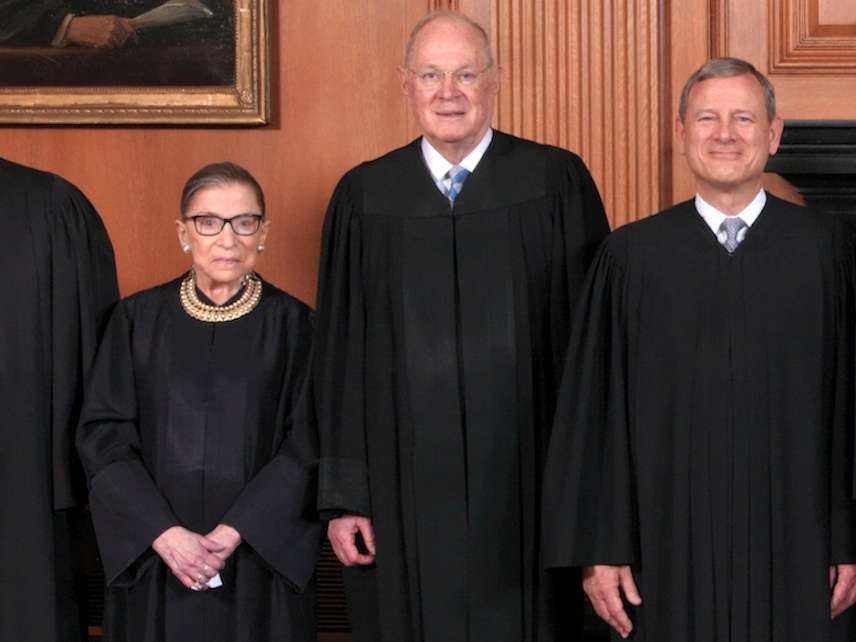3 Supreme Court Cases to Watch This Month
Here are the SCOTUS cases to watch in February.

February is shaping up to be quite a month at the U.S. Supreme Court. In the coming weeks, the justices will hear oral arguments in cases that tackle such contentious issues as the constitutionality of compulsory public-sector union fees, whether the First Amendment protects the wearing of certain political attire at the ballot box, and whether Microsoft must comply with federal warrants issued for email accounts whose data is stored overseas. Here are three Supreme Court cases to watch this month.
1. Janus v. American Federation of State, County, and Municipal Employees, Council 31
In the 1977 case of Abood v. Detroit Board of Education, the Supreme Court said that state governments may compel government workers to pay union fees as a condition of employment, even when those workers are not union members. The Court did so on the grounds that nonmember "free riders" should not be allowed to benefit from a public-sector union's collective bargaining activities. Later this month, the Supreme Court will hear oral arguments in a case that asks whether Abood should be overruled.
The case is Janus v. American Federation of State, County, and Municipal Employees, Council 31. Mark Janus, an Illinois public-sector employee, objects to being forced to pay fees to a union that he has refused to join, arguing that such compulsion violates his First Amendment rights by making him subsidize the union's political speech and activities. The American Federation of State, County, and Municipal Employees, by contrast, argues that the Abood precedent "is sound and underlies important and longstanding tenets of this Court's First Amendment jurisprudence," such as the idea "that certain labor-relations interests justify the small intrusion on employees' First Amendment interests that fair-share payments represent."
Oral arguments in Janus v. American Federation of State, County, and Municipal Employees, Council 31 are scheduled for February 26.
2. United States v. Microsoft Corporation
The Stored Communications Act (SCA) of 1986 contains several provisions designed to safeguard private communications that are held "in electronic storage." Among them is a requirement that law enforcement officials may only obtain the contents of such communications "pursuant to a warrant."
In 2013, federal authorities obtained a warrant for the contents of a drug suspect's Microsoft email account. But Microsoft refused to comply and moved to quash the warrant. Why? Because the email records in question happened to be stored in the company's datacenter in Dublin, Ireland. As Microsoft argues in its brief in United States v. Microsoft Corporation, "because statutes apply only domestically unless Congress clearly indicates otherwise, the SCA should be read to apply only to electronic communications stored here, just as other countries' laws govern electronic communications stored on their soil."
The federal government takes the opposite view. Under the Stored Communications Act, it told the Court, "the government may compel a U.S. service provider to disclose electronic communications within its control, regardless of whether the provider stores those communications in the United States or abroad." What is more, the government argues, Microsoft's interpretation of the SCA "would hamper domestic law enforcement and counterterrorism efforts" by creating a massive loophole that could allow any U.S.-based email account to escape the reach of U.S officials so long as the data is stored abroad.
Oral arguments in United States v. Microsoft Corporation are scheduled for February 27.
3. Minnesota Voters Alliance v. Mansky
Under Minnesota law, "a political badge, political button, or other political insignia may not be worn at or about the polling place on primary or election day." This ban applies to all apparel "designed to influence and impact voting" or "promoting a group with recognizable political views."
Andrew Cilek, the executive director of the conservative group Minnesota Voters Alliance, ran afoul of this law in 2010 when he tried to vote wearing a t-shirt adorned with an image of the Gadsen Flag, the phrase "Don't Tread on Me," and a Tea Party Patriots logo. Cilek was also wearing a "Please I.D. Me" button from the conservative group Election Integrity Watch. He is now spearheading a First Amendment lawsuit designed to strike the law from the books.
In essence, Minnesota Voters Alliance v. Mansky asks whether the Constitution allows state governments to ban political attire within 100 feet of a polling place on election day, even when that attire makes no mention of any candidate, any campaign, or any political party. In other words, do you have a First Amendment right to wear an Occupy Wall Street t-shirt, or to wear a Tea Party hat, while casting a ballot?
Oral arguments in Minnesota Voters Alliance v. Mansky are scheduled for February 28.



Show Comments (41)